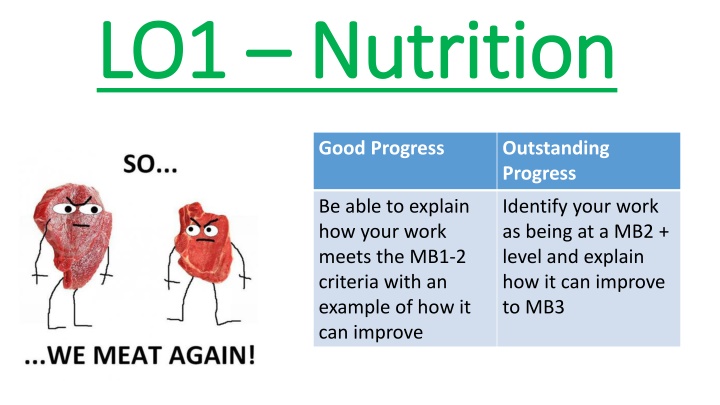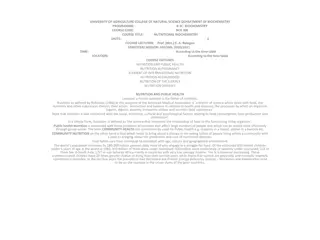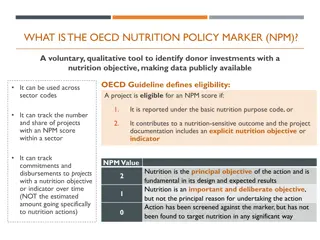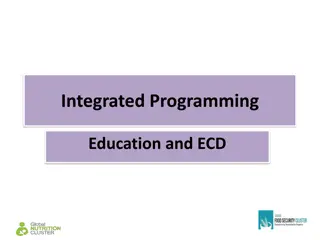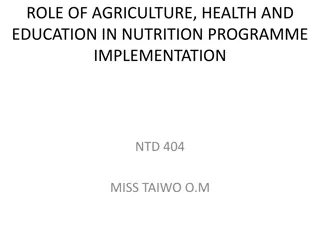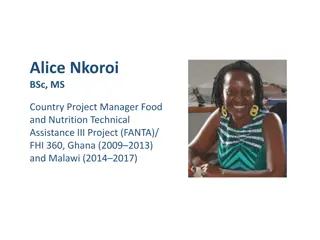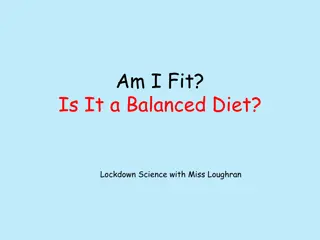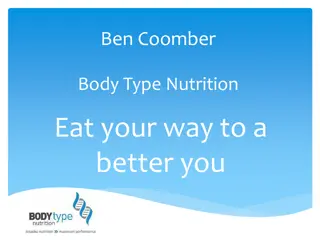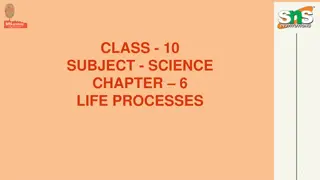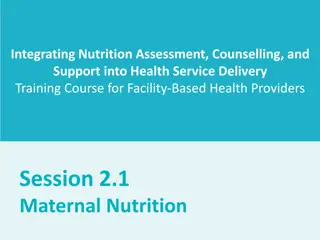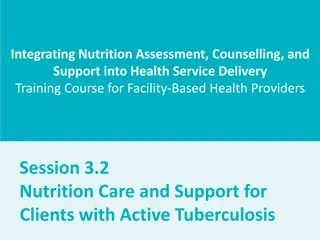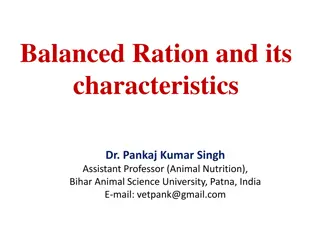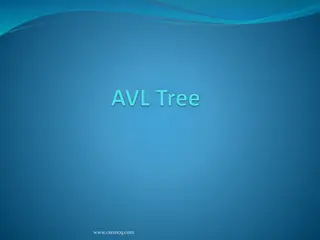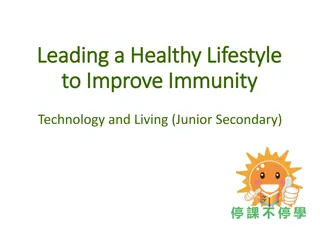Essential Guide to Balanced Nutrition for Optimal Health
Learn about the importance of nutrition in providing energy, repairing tissues, aiding growth, and maintaining overall health. Explore various food types, the benefits of a balanced diet, and considerations for individual dietary requirements. Discover how to meet nutritional needs by consuming a variety of foods while accommodating allergies, intolerances, and religious restrictions.
Download Presentation

Please find below an Image/Link to download the presentation.
The content on the website is provided AS IS for your information and personal use only. It may not be sold, licensed, or shared on other websites without obtaining consent from the author.If you encounter any issues during the download, it is possible that the publisher has removed the file from their server.
You are allowed to download the files provided on this website for personal or commercial use, subject to the condition that they are used lawfully. All files are the property of their respective owners.
The content on the website is provided AS IS for your information and personal use only. It may not be sold, licensed, or shared on other websites without obtaining consent from the author.
E N D
Presentation Transcript
LO1 LO1 Nutrition Nutrition Good Progress Outstanding Progress Be able to explain how your work meets the MB1-2 criteria with an example of how it can improve Identify your work as being at a MB2 + level and explain how it can improve to MB3
Diet Diet Diet produces energy What you eat is the fuel that allows your muscles to move
What does food do for me? What does food do for me? Provides energy Repairs injured tissue Helps our bodies grow Contributes to good general health A balanced diet produces enough energy for the working muscles and recovery after exercise
Types of foods Types of foods The 7 types of food:- 1. 2. 3. 4. 5. 6. 7. Carbohydrates Protein Fats Vitamins Minerals Fibre Water
Balanced diet Balanced diet Eat Variety of food types A balanced diet means not eating too much of one thing. You spread your daily food intake across different food sources to allow a good a balance of different nutrients This gives your body all the nutrients it needs to perform different tasks Meats, vegetables, fibre, fruit, fats and sugars https://stock.adobe.com/uk/templates/nutrition-wheel-infographic-and-food-icon-set/124175507
Balanced diet Balanced diet Suits the needs of the individual Some people have allergies for example lactose intolerance or allergy to nuts. The need to make their diet suitable for them and their lifestyle. Some religious beliefs restrict specific food types for example the Jewish & Islamic society do not eat pork so they would get this protein source from other food types. Allergies, intolerance to some foods, religious restrictions on some foods
Balanced diet Balanced diet Nutritional requirements of the individual You need to identify how many calories you burn on an average day and eat at least this much. Otherwise you could loose energy and weight. People with active lifestyles burn more calories and then need to eat more to compensate. Consumer enough the amount of calories that are burnt each day
What is a nutrient What is a nutrient What nutrients are chemicals a living organism needs in order to live and grow
Types of nutrients Types of nutrients Macronutrients Carbohydrates Fats Protein Micronutrients Vitamins Minerals Water keeps temperature Fibre - digestion
Role of nutrients Role of nutrients Carbohydrates Energy Fats Energy (fast use) Proteins Recovery Fibre Healthy digestive system Water - Hydration Vitamins & minerals Healthy immune system & cell replenish A triathlete would need to eat vitamins and minerals so they could train consistently over time and not get sick and ruin their training. For example a marathon runner would need carbohydrates to maintain performance and energy during a race. A footballer would need a high level of protein to recover after a football match and make sure he does not have sore muscles. Link each one to at least two sporting examples
Sources of nutrients Give at least 3 examples of each food group Carbohydrates pasta, potatoes, toast Protein buts, chicken, eggs Fats red meat, Vitamins & minerals broccoli, fruit, Etc etc
LO1 CAU LO1 CAU Work through LO1 Independently make sure you explain the following For 1. Balanced diet 2. Nutritional requirements of individual 3. Why we need a variety of food types 4. What nutrients are 5. Role of the nutrients (what they do for the body) 6. Types of food groups 7. Needs & tastes of the individual guidance use your spec check sheet!
Quality of Work Quality of Work MB2 4-6 Marks MB1 1-3 Marks MB3 7-9 Marks Identifies some of the characteristics of a balanced diet. Provides a limited description of what nutrients are and their role within a healthy balanced diet, giving a limited range of examples of food sources of nutrients. Describes in detail all of the characteristics of a balanced diet. Comprehensively describes what nutrients are and their role within a healthy balanced diet, giving a wide range of examples of food sources of nutrients. Briefly describes most of the characteristics of a balanced diet. Describes in detail what nutrients are and their role within a healthy balanced diet, giving a range of examples of food sources of nutrients.
